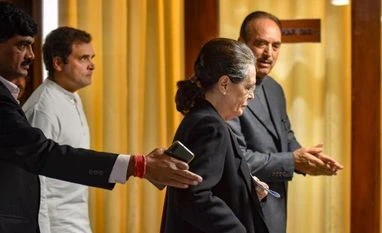As protests against the Citizenship Amendment Act (CAA) rage across the country, Congress is increasingly feeling the need to broad-base them to encompass issues of economic slowdown, joblessness, inflation and farm distress.
On January 28, days ahead of the Union Budget, Congress leader Rahul Gandhi will address a public meeting in Jaipur. The focus of his speech would be unemployment and inflation. This will be the first of several such meetings he will address across the country, party sources said. The former Congress president is also likely to address a rally in Madhya Pradesh, where he will focus on issues confronting the farmers, tribals and rural workers. Further, he is likely to address a meeting of small and medium industrialists, traders and professionals at Mumbai. Interestingly, the party is yet to schedule any meeting in Delhi, which will vote to elect its new Assembly on February 8.
Meanwhile, the Supreme Court will start hearing over a hundred petitions challenging CAA as unconstitutional from Wednesday.
Congress strategists, and those of other opposition parties, understand it would get difficult for them to champion the cause of anti-CAA protesters if the apex court were to find the controversial law constitutional. They are uneasy that such a situation might trigger further protests, and with mainstream political parties unable to stand with the protesters, radical elements could take over the protests.
The issue of the National Population Register (NPR) is similarly vexed. The Congress-led state governments, and those of other opposition parties, cannot afford to flout the Centre’s notification to conduct the NPR. If they do, these state governments could run the risk of getting sacked.
Nearly all Congress-run-state governments, and coalitions, which include Madhya Pradesh, Chhattisgarh, Rajasthan, Jharkhand, Punjab, and Maharashtra, still have a better part of their respective tenures left. Most of these states are rich in natural resources and Congress would not like to sacrifice them.
The only state governments that can afford to take the risk of going against the Centre are Trinamool Congress-led West Bengal and CPI (M)-led Kerala. Elections in these two states are due in May 2021. These are also the only two governments that have officially instructed their respective administrations to not conduct NPR.
The Congress, and other opposition parties, now plan to focus their energy on targetting the Narendra Modi led government on the economy in public meetings and in Parliament.
For the upcoming Budget session, the Congress MPs plan to ask questions of the government not just on the “chronology” of CAA, NPR and National Register of Citizens (NRC), but on the economic slowdown.
In its recent public statements, including press conferences, the Congress has spoken against the CAA along with raising the issue of slowdown, joblessness, and inflation. It believes the youth have come out on the streets to protest against the CAA because of despair and hopelessness about the lack of jobs.
Addressing a press conference in the national capital on Tuesday, Congress leader Kapil Sibal spoke of the latest International Monetary Fund (IMF) growth numbers for India. “In India, today in the age group of 20-25 years in the year 2019, the unemployment rate is 63 per cent, the graduate unemployment. That is why children are out in the street. It has nothing to do…,” Sibal said. He said India’s youth are despairing about their future, whether they will get a job or not. “You (Modi) talk of CAA, NPR, and NRC as if India does not face any other challenge,” he said.
With the Centre and Union Home Minister Amit Shah unwilling to retract on the issue of CAA, the opposition believes it is incumbent that it does not allow radical elements to take over the protests, steer the protests to the issue of economic distress, including smaller towns and rural India into the conversation but also ensure that anti-CAA protesters do not feel abandoned.
It would be a daunting task.
Unlock 30+ premium stories daily hand-picked by our editors, across devices on browser and app.
Pick your 5 favourite companies, get a daily email with all news updates on them.
Full access to our intuitive epaper - clip, save, share articles from any device; newspaper archives from 2006.
Preferential invites to Business Standard events.
Curated newsletters on markets, personal finance, policy & politics, start-ups, technology, and more.
)